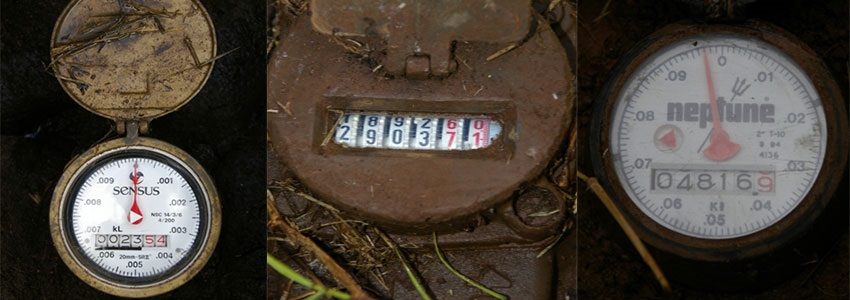
Water meters are an important part of Council’s water supply infrastructure. There are over 12,500 water meters in the Council’s water meter fleet Meters accurately record the water consumed by each property. This enables billing by Council for the water consumed and permits Council to account for all the water supplied to the community.
Reading Water Meters
Water meters measure the amount of water you use at your property. This measurement allows Council to accurately charge customers for the water they’ve used. It also helps customers to monitor their water use. The meter records usage in kilolitres. Meters are read manually or electronically four times a year, generally in the months of June, September, March and December.
Black numbers tell you how many kilolitres you have used, Red numbers tell you how many litres you have used.
Bathurst Regional Council requires access to its meters for meter reading and routine maintenance. Meters should not be made inaccessible behind a fence or wall, or covered by trees or shrubs. Dogs and other pets should be suitably restrained.
Council staff will always make sure the water meter and surrounding area is returned to the way it was upon arrival. Meter readers carry tools to enable them to access and read the meters without disturbing residents’ property.
Residents are encouraged to monitor usage as this will assist households to monitor and potentially reduce water consumption, in turn possibly reducing the cost of quarterly water bills.
Smart Meters
A smart meter is a device that automatically records water use and can report that usage data electronically at regular intervals. This provides instant access for Council staff to data that can highlight any issues or trends to better manage the water network. For more information about smart meters, please follow this link SMART CITY.
Leaking meters and Pipes
1. Know Your Dials
Make sure that you know what the dials on the water meter measure. See reading water meters.
2. Turn off all taps
Ensure that all taps within the house and garden (not including the stop-tap) are turned off, and that all water appliances, including toilets, dishwashers and washing machines, are NOT being used.
3. Is the wheel moving?
Examine the meter for a few minutes and note any movement
4. Take two readings
To determine the extent of a leak, take a start reading, wait 10 minutes, then take a final reading. Don’t forget to read all of the dials.
5. What’s the difference?
Subtract the start reading from the final reading. Be sure to write your answer in litres and not kilolitres. Multiply by six to determine the amount of litres lost per hour.
6. Fix the Leak
If a leak is detected, arrange for a plumber to locate and repair the leak.